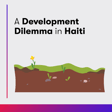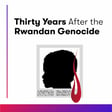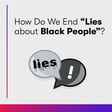Become a Creator today!Start creating today - Share your story with the world!
Start for free
00:00:00
00:00:01

How Do We End "Lies about Black People"?
Can you think of a stereotype or lie you’ve heard about Black people? Do you know how or when that stereotype came to be? In this episode, SIS professor Omekongo Dibinga joins Big World to discuss his new book, Lies About Black People: How to Combat Racist Stereotypes and Why it Matters, and explain how we can improve on our antiracist journeys.
Dibinga begins our conversation by explaining the original idea and his research and writing process for the book (2:14), then moves to discussing how lies and stereotypes gain power in people's minds (4:28). Dibinga also explains why he doesn’t use the term “BIPOC” (7:55) and why reexamining our vocabulary is so important (9:44).
Where did the ‘Black people can’t swim’ stereotype come from (12:19)? How have whitewashed, revisionist versions of history detracted from our knowledge of our authentic history and experiences as Americans (20:02)? Dibinga answers these questions and more. To close out the discussion, Dibinga shares why celebrating and acknowledging Black history and achievements is so important (28:45).
In the “Take 5” segment (17:55) of this episode, Dibinga answers this question: What are five ways that people can identify preconceived notions and work to improve on their anti-racist journey?
Recommended
















